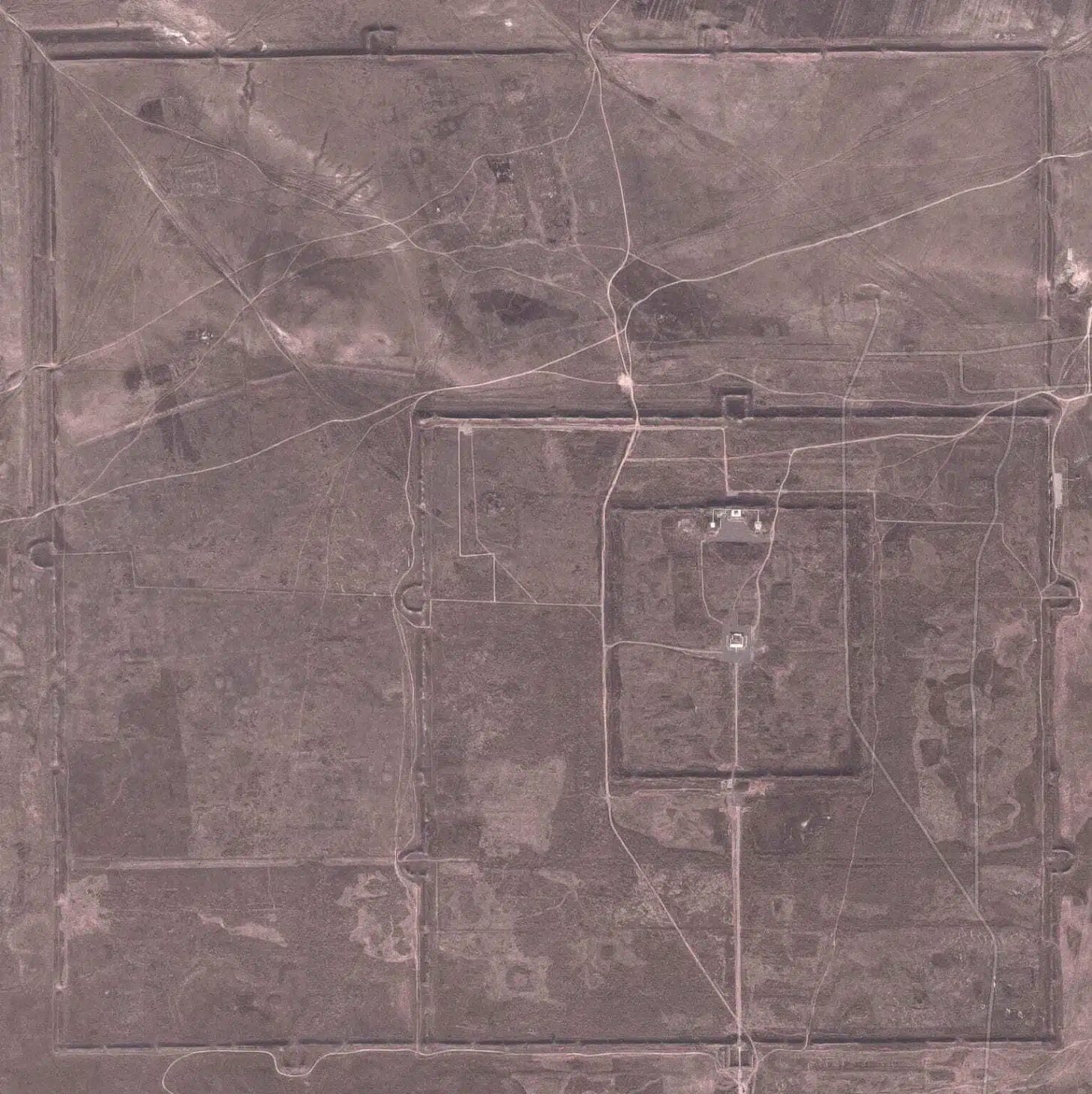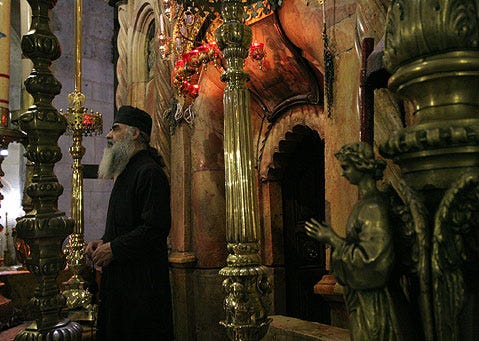REVIEW: In Xanadu, by William Dalrymple
In Xanadu: A Quest, William Dalrymple (Penguin Books, 1989).
The saddest thing about leaving the kóryos and becoming a human being is that I feel bad about abandoning my family for weeks or months to embark on a dangerous journey with a quixotic purpose. So I do it a little less often, and make up the difference with travel memoirs.
I read all sorts of travel memoirs, ancient and modern, prosaic and exotic, but my favorite subgenre of this rich and diverse seam has to be “British toff goes backpacking,” a venerable and heterogeneous category in its own right.1 What I love about the British travelogues is the mixture of aristocratic insouciance, quirky or gimmicky objective, and total lack of preparation. The modal such book begins with a premise like “I retraced the campaigns of Alexander the Great on a pogo stick” or “I traveled across Africa using only public transit” (that one actually exists), and then the author sets off without a map or a change of clothes or any cash, armed only with bluster and with an attitude of total invulnerability. This is also how I travel, and I love it. Game recognize game.
What I don’t love is that most of these books are written by assholes. Perhaps it’s inevitable that the sort of personality that leads a man to try to bluff his way across heavily militarized borders sans visa will also lead him to have a snarky and bitchy narrative voice. Too many of these books drip with contempt for the people and places they portray. One of the worst offenders is the king of the genre — Robert Byron, whose Road to Oxiana is a legendary classic that was highly recommended to me, and also one of the only books I’ve literally flung down while muttering “fuck you too, buddy.”
All of which is to say that I adore William Dalrymple’s stuff because he has all of the best qualities of a British travel author and none of the bad ones. He practically bubbles over with curiosity and compassion for the weirdos he meets, and he's interested in...everything, and frighteningly erudite about it all. This is the stuff that would later cause him to hit it big, but In Xanadu was written when he was 22, and that frightening erudition is already in evidence.
First, the ridiculous premise: in the 1270s, Marco Polo set out to bring a vial of sacred oil from the Church of the Holy Sepulcher in Jerusalem to the Summer Palace of Kublai Khan. Dalrymple decides that he should do this too, so in classic British travel author fashion he shows up at the holiest site in Christendom and browbeats a monk into giving him some oil. So far so good, but there are complications: for starters, at the time of his journey nobody knew where Xanadu was anymore, its location had been lost to history. For another, the route took him through some of the most dangerous places on earth, including the newly-established Islamic Republic of Iran, and some heavily militarized portions of Western China and Tibet. Finally, his traveling companions were two blonde Englishwomen — the girlfriend he was madly in love with (and who dumps him right before they start), and the probable lesbian with a mild crush on him — thus ensuring that he would stand out wherever he went.
Along the way, he visits a ton of places that were already on my list. For instance early in the trip he stops in Shaizar, once ruled by Usamah ibn-Munqidh, which I’ve wanted to visit2 ever since reading his 12th century memoir An Arab-Syrian Gentleman and Warrior in the Period of the Crusades.3 Shortly afterwards he’s in Sivas (which classicists will know as Sebasteia), founded by Pompey the Great during the war with Mithridates and place of the martyrdom of the Holy Forty Martyrs of Sebaste (and formerly the heart of the Christian community of Eastern Anatolia, until they were exterminated in the 20th century). He even gets to Sinop (Sinope) which I mostly want to visit because it looks cool on the map,4 but which also has a fascinating history in its own right (and I’ll even forgive it for being the birthplace of Diogenes).
And all of that is just the letter ‘S’! But rather than run you through the rest of the alphabet, let me tell you why else I love this book. See, once long ago I wanted to be a scientist, because I naively believed that scientists were people who discovered new things about the world through patient observation and the application of reason. I then spent a little while in the science mines myself, and discovered that actually scientists are people who write grant proposals, fight with IRBs, and make inexcusable statistical errors. But the romance remained, and eventually I figured out that what I really wanted to be was a scientist in the 17th century.
A mere few hundred years ago, the frontiers of human knowledge were a lot closer to everyday experience, and it was feasible for an ordinary man to push them, often as a hobby. The trouble is that these days we know so much, in most fields you can’t even begin to do original work without first spending years in dedicated study. Even then, all of the low-hanging fruit has already been plucked, so your options are to be a once-in-a-generation supergenius, or to stand at the head of a major laboratory (here come those grant proposals) and only attack problems that by their very nature are intractable without an industrial-scale level of effort. What you certainly can’t do is just be a gentleman scholar and wander out into your backyard and tinker with some optics and discover a new planet or a new class of life. Right?
Dalrymple is a gentleman scholar, an eccentric, a dabbler, and let us not forget 22 years old at the time of this trip, and he very possibly makes two original discoveries of historical and archaeological significance. The first is the location of Xanadu itself, which as I mentioned had been lost in the intervening century since the last British expedition in 1872. But it’s the object of Dalrymple’s quest, so he just heads to Inner Mongolia, consults a few notes from historical expeditions plus that Coleridge poem everybody knows and just…finds it (or what’s left of it). Everything related to this is remarkably difficult to Google, but as far as I can tell the site that he stumbled upon is now considered the correct one, and is currently undergoing restoration as a UNESCO World Heritage Site.

His other discovery is even more profound, and somehow has been even less remarked upon in the intervening years. The Gospel according to Matthew describes the journey of the Magi to visit the newborn Lord thus:
Now when Jesus was born in Bethlehem of Judaea in the days of Herod the king, behold, there came wise men from the east to Jerusalem (Matthew 2:1)
But that translation conceals something that sticks out in the original Greek:
Τοῦ δὲ Ἰησοῦ γεννηθέντος ἐν Βηθλέεμ τῆς Ἰουδαίας ἐν ἡμέραις Ἡρῴδου τοῦ βασιλέως, ἰδοὺ μάγοι ἀπὸ ἀνατολῶν παρεγένοντο εἰς Ἱεροσόλυμα
This is “easy” Greek, the Greek of a fisherman, Greek that even a klutz like me can read, Greek full of simple, straightforward, workman-like words. Well…all except for one word, which is totally foreign in its origin, and would’ve stood out from all the others to an audience of native Greek speakers. “μάγοι,” which the King James Bible translates as “wise men”, and which I left untranslated as “Magi,” is not a Greek word at all.
The word is Persian, and rather than denoting a generic wise man, it specifically refers to a Zoroastrian priest-astronomer. So St. Matthew is going to some pains, even using a foreign word,5 to tell us the specific national origin of those who followed a star to the Nativity. This was once common knowledge: Runciman mentions in The First Crusade that after the Persians defeated the Byzantines in the Seventh Century and burned and pillaged every church in Palestine, one building was spared: the Church of the Nativity in Bethlehem. Why? Presumably because of the massive mosaic over its doors depicting the Magi in Persian garb.
All of this is great news for those of us who believe that this was a real event with real people, because real people come from somewhere, and the proper, traditional reading of Matthew’s gospel gives us a clue that narrows it down to a specific country. Can we narrow it down any further? Well as it happens, when Marco Polo traveled through Persia in the 1270s, he wrote down a rather odd story at one point:
In Persia is the city of Saveh, from which the Three Magi set out when they were to worship Jesus Christ; and in this city they are buried, in three very large and beautiful monuments, side by side. And above them there is a square building, carefully kept.
Polo goes on to relate a story from the Zoroastrian leaders of Saveh, who tell of how in times long past, three great men went away to worship a prophet that was born in a far-off land in the West, and brought with them offerings of gold, frankincense, and myrrh. The story “from the other side” has some interesting similarities and differences with the Christian tradition. For instance: both agree that gold is a symbol of kingship and that frankincense represents divinity. But whereas Christians (especially Western Christians) generally take the myrrh to be a foreshadowing of Christ’s death (the origin for this is that myrrh is mentioned in the Old Testament as an embalming herb), the Persians believed it was a healing herb, and so the trio of gifts were for the one who is “True God and True King and True Physician.”
It seems plausible that the Zoroastrian community of Saveh retained an independent account of a journey to Bethlehem, the other end of which is recounted in the Gospel of Matthew. On the other hand it also seems plausible that much later in history, the dwindling Zoroastrians looked for a way to retcon themselves into the Gospel narrative. Well, just what kind of place was Saveh anyways? By the time Polo got there, it was a giant smoking crater with almost every previous trace of its glory wiped out by the Mongols. But before that happened, it was the greatest astronomical observatory town in Asia, al-Qazwini describes rooms full of scientific instruments, clockwork mechanisms, globes, and an enormous astronomical library. What’s more, it had been such a center of knowledge for over a thousand years. In other words, if there were Magi looking for a star anywhere, it would have been in Saveh. As luck would have it, the modern city of Saveh was right on Dalrymple’s route through Iran, but if you want to learn what he did and didn’t find there, you’ll have to read the book.
Once again, the point is that he just had a hunch and went out and looked for something, the way scientists have done for millennia, but supposedly can’t do anymore. For most questions in most fields, if it were possible for a single amateur to answer them, then they’ve long-since been answered. Dalrymple’s luck with Xanadu and with Saveh was partly due to good timing (inquiry had been blocked for a long time by geopolitical factors, and he showed up right when the window opened again), and partly to the fact that the topics he was interested in were unfashionable academic backwaters. But most of us can’t get that lucky, right?
The frontiers of knowledge are pretty far out there these days, but they don’t only move in a single direction. The conceit that they do, that scientific knowledge always grows and never shrinks, is a delusion wrought by the whiggish metaphysical underpinnings of our culture. The first time I really got this was after reading Maciej Cegłowski’s post on how the cure to scurvy was found and then lost again, but other examples abound. For instance, did you know that many ancient astronomers, probably including some of the magi hanging out in Saveh, believed in a heliocentric model of the universe? Ptolemy’s geocentrism was the hot new progressive theory, justified with a combination of observation (absence of stellar parallax) and deduction (no deflection of objects in motion due to earth’s rotation). Karl Popper would be proud!
It’s a little harder to spot cases of this in our own society — almost tautologically so, because if we knew where this regress was happening, it wouldn’t be happening! Nevertheless, we can be certain it’s happening. The ongoing ideological activation of our society, and of the academy in particular, all but guarantees it. The nature of mutual polarization is that the readers of this substack will all agree that we’re heading towards a very scary sort of totalitarianism-lite, but you all disagree about which direction that slide is in. I obviously agree with half of you and think the other half are incredibly stupid and blind, but it doesn’t actually matter who’s right. A shared feature of Nazi Germany and the Soviet Union was that they both were intolerant of research that violated official ideology.6 It doesn’t actually matter which way we go, because either way the future looks very bearish for independent inquiry, and many of you can probably already see the signs of this.
All of this is bad news for the progress of human knowledge, and for the good functioning of the systems that are downstream of it. But it’s great news for armchair gentleman scientists who want to make real discoveries. The Great Forgetting currently underway will devastate many fields of knowledge, but the ignorance of our new dark age will create countless opportunities for amateur discovery. So cheer up! Put on your waders and go mucking around in the metaphorical stream out back. For the first time in decades, there may soon be things to (re)discover.
Earlier examples certainly exist, but I would argue the genre really got rolling around the 1850s. William Kinglake’s Eothen is a good early representative of the style.
Hopefully it will still be there when the United States is no longer sponsoring terrorism in the area and I can safely visit.
Dalrymple recounts an anecdote from Usamah’s book that I, uh, also found memorable, but which I cannot print here because this is a Family-Friendly Substack. Now you have an extra reason to look up this Syrian classic.
As a child who was (a) constantly bored and (b) an inveterate shape-rotator, I spent a looooong time staring at maps, admiring the places where the abstract geometries representing water and land came together in especially interesting ways. I have a whole stack of places I want to visit more or less because they’re situated on an especially weird-looking chunk of coastline.
The effect for a Greek speaker is probably something like if you read a normal English sentence that referred to a “Shah” or an “Ayatollah,” it would stick out and be very specific. Also now I’m giggling imagining a children’s nativity play where the Magi all have the beard and the eyebrows.
Everybody thinks of examples like Deutsche Physik and Lysenkoism, but really Deutsche Mathematik was much funnier. To stamp out Jewish influence in mathematics, they vigorously opposed set theory because it was created by Jews like Zermelo (not actually Jewish) and Cantor (also not Jewish). Instead, they promoted good German theories like finitism, established by good Germans like Kronecker (who was Jewish).




This is great. I assume you've read Fermor, who might be the king of this genre.
Shape rotator my ass, this was a joy to read. Thanks